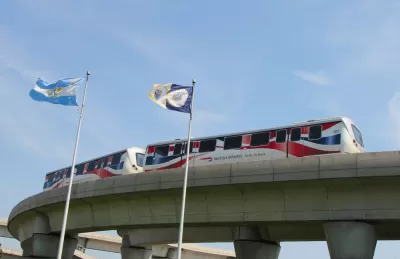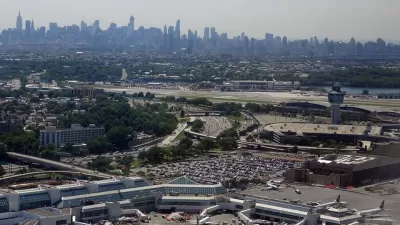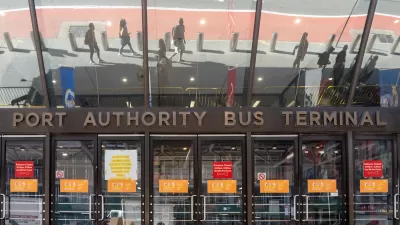Some inquisitive and interested observers noticed surprising changes to the schedule of the AirTrain, connecting Queens to JFK International Airport.

"By most accounts, the JFK AirTrain has been a success story." So goes the auspicious opening line of an article by Benjamin Kabak, which has found some numbers that cast doubt on the success story.
Kabak also acknowledges early on that the AirTRain served 2.5 million riders in its first year—a number that grew to 6.5 million ten years later in 2014. "But a funny thing happened on the way to 6.5 million riders: The Port Authority has quietly reduced the frequency of service on the AirTrain," writes Kabak.
In addition to the concern about reduced frequencies on such a popular service, Kabak expresses frustration with the lack of transparency regarding the reduced frequencies. On the former concern:
As recently as 2009, the Port Authority operated the JFK AirTrain on five-minute peak-hour headways and 10-minute off-peak headways. A recent brochure tells a much different story as peak headways are now 7-12 minutes with service operating every 10-15 minutes between 7:30 a.m. – 3 p.m. and every 15-20 minutes from 8 p.m. until 4 a.m. This is, effectively, a 50 percent service cut.
And on the latter frustration:
It’s not quite clear when these new timetables went into effect or why. The Port Authority hasn’t responded to requests for comment yet. But posts on an aviation-related message board indicate reduced AirTrain frequency as long ago as 2011. This isn’t a new problem, but it seems to be one the Port Authority has slipped past the public without much notice.
Kabak doesn't shy away from criticism of the Port Authority of New York and New Jersey, which runs the AirTrain, but his concern is that reduced service and crowded trains might indicate larger problems with the 12-year old system. Also, there's a LaGuardia AirTrain proposal, out of Governor Andrew Cuomo's office, still on the table and very much up for debate.
FULL STORY: A look at the decreasing frequency of the JFK AirTrain

Trump Administration Could Effectively End Housing Voucher Program
Federal officials are eyeing major cuts to the Section 8 program that helps millions of low-income households pay rent.

Planetizen Federal Action Tracker
A weekly monitor of how Trump’s orders and actions are impacting planners and planning in America.

Ken Jennings Launches Transit Web Series
The Jeopardy champ wants you to ride public transit.

Tackling Soil Contamination With Nature-Based Solutions
Los Angeles County residents and experts are turning to nature-based methods like bioremediation to address long-standing and fire-exacerbated soil contamination without resorting to costly and disruptive removal.

Rebuilding Smarter: How LA County Is Guiding Fire-Ravaged Communities Toward Resilience
Los Angeles County is leading a coordinated effort to help fire-impacted communities rebuild with resilience by providing recovery resources, promoting fire-wise design, and aligning reconstruction with broader sustainability and climate goals.

When Borders Blur: Regional Collaboration in Action
As regional challenges outgrow city boundaries, “When Borders Blur” explores how cross-jurisdictional collaboration can drive smarter, more resilient urban planning, sharing real-world lessons from thriving partnerships across North America.
Urban Design for Planners 1: Software Tools
This six-course series explores essential urban design concepts using open source software and equips planners with the tools they need to participate fully in the urban design process.
Planning for Universal Design
Learn the tools for implementing Universal Design in planning regulations.
Ada County Highway District
Clanton & Associates, Inc.
Jessamine County Fiscal Court
Institute for Housing and Urban Development Studies (IHS)
City of Grandview
Harvard GSD Executive Education
Toledo-Lucas County Plan Commissions
Salt Lake City
NYU Wagner Graduate School of Public Service




























